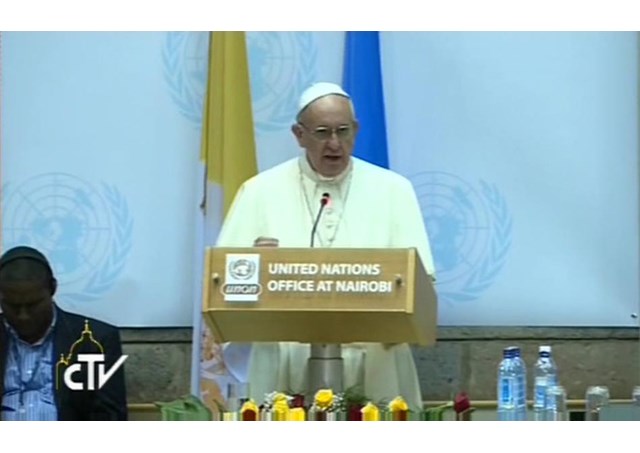
“Regional free trade treaties dealing with the protection of intellectual property, particularly in the areas of pharmaceuticals and biotechnology, should not only maintain intact the powers granted to states by multilateral agreements, but should also be a means for ensuring a minimum of health care and access to basic treatment for all – Pope Francis (2015)”
Developing countries should be allowed the time and flexibility needed for them to comfortably comply with trade agreements. This was Pope Francis’ message yesterday when he addressed UN officials at the United Nations Office at Nairobi. He further emphasized the need for governments to focus on elimination of malaria, tuberculosis and the treatment of orphan diseases.
According to MedicineNet Inc, an online health care media publishing company, orphan diseases as rare diseases that affect less than 200,000 people or a common disease that has been largely ignored because it is more prevalent in developing countries than in the developed world.
The Pope’s message translates to the fact that there is an urgent need to build on research and development capacity for neglected tropical diseases which largely affect Middle East and African countries, posing a health risk and economic burden to many developing countries.
Historically, pharmaceutical companies have largely neglected Research and Development in respect of such diseases as they do not generate any financial incentives- tropical medicines largely serve developing countries which do not have capacity to cough up money for patented medicines. Any new tropical medicines would therefore be subject to compulsory licensing, which pharmaceutical companies argue denies them an opportunity to recoup their sunk costs of research and development.
His message further highlights the effects of regional and bilateral free trade agreements to health care systems of developing countries. The detrimental effects are caused by attempts to broaden the requirements of TRIPS by imposing more stringent patent protection measures- ‘TRIPS-plus agreements.’
Some of the significant TRIPS-plus provisions include:
- Patent term extensions beyond the 20 years required by TRIPS thereby increasing monopoly and limiting the entry of generic manufacturers.
- Broader scope of patentable subject matter to include patents for new uses or forms of known pharmaceutical products.
- Restrictions on the grounds of issuing compulsory licenses which may preclude the grant of licenses for public health reasons.
- Data exclusivity which prohibits the use of pharmaceutical test data for a certain period of time thus preventing the use of test data for manufacture of generic drugs.
- Patent linkage which prohibits the registration of generics of patented medicines. Patent linkage discourages the registration of generic medicines.
Pope Francis’ message primarily emphasizes that trade regulations should promote the smooth functioning of health care systems rather than hamper the efforts of developing countries in providing access to basic treatment for all.
This couldn’t have come at a better time; as Nairobi welcomes the 10th Ministerial Conference of the World Trade Organization, it will be interesting to see the deliberations on the complex relationship between intellectual property protection and access to medicines for the developing world.